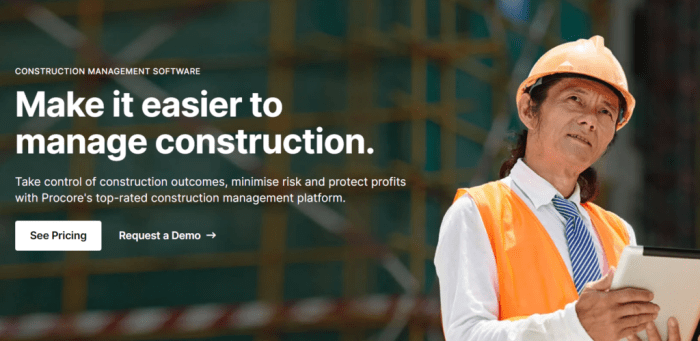Best crm software for construction – The construction industry is notoriously complex, juggling multiple projects, subcontractors, clients, and materials simultaneously. Effective project management and client communication are paramount to success. A robust Customer Relationship Management (CRM) system can be the key to streamlining operations, improving efficiency, and boosting profitability. This comprehensive guide explores the best CRM software options specifically designed to meet the unique needs of construction businesses, helping you choose the perfect solution to elevate your company.

Source: pttrns.com
Understanding the Needs of Construction CRM Software
Unlike generic CRM systems, construction-specific software needs to handle the intricacies of the industry. Key features to look for include:
- Project Management Capabilities: Tracking project timelines, milestones, budgets, and resource allocation is crucial. The ideal CRM should integrate seamlessly with project management tools.
- Lead Management: Capturing, nurturing, and converting leads into paying clients is essential. A robust lead management system with automated workflows can significantly improve sales.
- Subcontractor Management: Efficiently managing subcontractors, tracking their performance, and ensuring timely payments are vital for smooth project execution. The CRM should facilitate communication and collaboration.
- Document Management: Centralized storage and easy access to contracts, blueprints, permits, and other crucial documents are critical for minimizing errors and delays.
- Reporting and Analytics: Comprehensive reporting capabilities allow you to track key performance indicators (KPIs), identify areas for improvement, and make data-driven decisions.
- Mobile Accessibility: On-site access to project information and client communication is essential for field teams. A mobile-friendly CRM ensures everyone stays connected.
- Integration with Other Tools: Seamless integration with accounting software, estimating tools, and other industry-specific applications is highly beneficial for optimizing workflows.
Top CRM Software for Construction Companies: Best Crm Software For Construction
Several excellent CRM solutions cater specifically to the construction industry. Here are some of the leading contenders:
1. CoConstruct
CoConstruct is a popular choice, known for its intuitive interface and comprehensive project management features. It excels in managing client communication, project timelines, and budgets. Its strong focus on the construction industry makes it a powerful tool for improving efficiency and collaboration.
2. Buildertrend
Buildertrend offers a robust platform for managing all aspects of construction projects, from initial lead generation to final client handover. Its features include detailed project scheduling, client portals, and robust reporting capabilities. It’s a good option for larger construction companies managing numerous projects simultaneously.
3. Procore
Procore is a comprehensive construction management software that includes CRM functionalities. It’s widely used by large construction firms for its powerful project management features, collaboration tools, and detailed reporting. While not solely a CRM, its robust capabilities in this area make it a strong contender.
4. ServiceTitan
While primarily known for its field service management capabilities, ServiceTitan offers strong CRM features beneficial for smaller construction companies, particularly those involved in home renovations and repairs. Its focus on scheduling, dispatching, and customer communication makes it a valuable asset.
5. Zoho CRM, Best crm software for construction
Zoho CRM is a more general-purpose CRM, but its customizability allows it to be adapted for construction needs. Through the use of custom fields and workflows, you can tailor it to manage projects, subcontractors, and client communications effectively. It’s a cost-effective option for businesses with specific needs.
Choosing the Right CRM for Your Construction Business
Selecting the right CRM depends on your company’s size, budget, and specific requirements. Consider the following factors:
- Size of your company: Smaller firms may benefit from simpler, more affordable solutions, while larger enterprises may require more robust and scalable platforms.
- Budget: CRM software pricing varies widely. Evaluate the cost against the potential return on investment (ROI).
- Specific needs: Identify your key pain points and choose a CRM that addresses them effectively. Prioritize features that align with your business processes.
- Integration capabilities: Ensure the CRM integrates seamlessly with your existing software and tools.
- Ease of use: Opt for a user-friendly interface that is easy to learn and navigate for your team.
- Customer support: Reliable customer support is crucial for resolving issues and getting the most out of your CRM.
Frequently Asked Questions (FAQs)
- Q: What is the cost of construction CRM software? A: Pricing varies greatly depending on the features, scalability, and vendor. Expect to pay anywhere from a few hundred dollars per month to several thousand for enterprise-level solutions.
- Q: Can I integrate my existing accounting software with a construction CRM? A: Many construction CRMs offer integrations with popular accounting software such as QuickBooks and Xero. Check the specific integrations offered by your chosen software.
- Q: How long does it take to implement a new CRM? A: Implementation time varies depending on the complexity of the software and your company’s processes. Allow sufficient time for training and data migration.
- Q: What are the key performance indicators (KPIs) to track in a construction CRM? A: Important KPIs include project completion rates, budget adherence, client satisfaction, lead conversion rates, and subcontractor performance.
- Q: Is cloud-based CRM better than on-premise software? A: Cloud-based CRMs generally offer greater accessibility, scalability, and cost-effectiveness, while on-premise solutions offer more control over data security.
Conclusion
Investing in the right CRM software is a strategic move for any construction business seeking to enhance efficiency, improve client relationships, and boost profitability. By carefully evaluating your needs and exploring the available options, you can find the perfect solution to streamline your operations and achieve sustainable growth. Take the time to research and compare different platforms to make an informed decision that aligns with your long-term goals.

Source: psdcenter.com
Call to Action
Ready to transform your construction business? Explore the leading CRM options discussed above and request a demo today! Start building a more efficient and profitable future.
FAQs
What are the key features to look for in construction CRM software?
Key features include robust contact management, project tracking with timelines and milestones, document management, lead generation tools, reporting and analytics dashboards, and ideally, mobile accessibility.
How much does construction CRM software typically cost?
Pricing varies greatly depending on features, the number of users, and the vendor. Expect to find options ranging from affordable monthly subscriptions to more comprehensive enterprise solutions with higher costs.
Can CRM software integrate with other construction management tools?
Many CRM systems offer integration capabilities with other software, such as accounting software, project management platforms, and scheduling tools. Check for API integrations or pre-built connectors to ensure seamless data flow.
How long does it take to implement a new CRM system?
Implementation time depends on the complexity of the system and the size of your business. It can range from a few weeks for simpler systems to several months for more complex integrations and data migrations.
